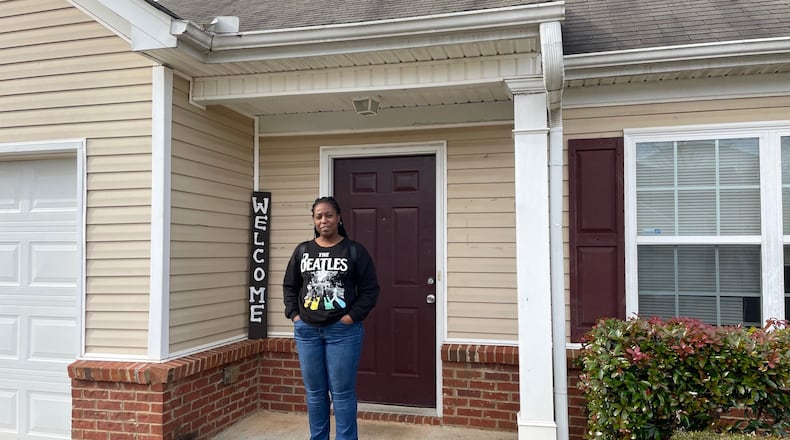Everyone appreciates a story of resilience, of earnest people overcoming what life throws at them.
And it’s even better when there are people stepping up to help. With Christmas here, what better time to dwell on humanity’s bright side?
Last year at this time, Divonia Boyd, 28, was living in an extended stay motel in DeKalb County near I-20. Christmas in an extended stay is never a heartwarming tale. Worse, her five young children were with her. That’s right, five kids living week after week in a single, cramped motel room. They even “attended” virtual class, with one child using a school-provided computer tablet and earphones on one bed, another on a second bed and a third at the table as Mom tried to make do with the other two.
It’s like something a modern-day Charles Dickens might imagine.
This year, the family is living in a three-bedroom Lawrenceville townhome. All is well? Nah, this is a newspaper story, not a fable. But life is trending in the right direction for Boyd and her family thanks to the good works of many, especially herself.
Boyd was like thousands of metro Atlanta families, eking out a living to remain in extended stay motels, which are the last stop to homelessness. Certainly, a motel room is better than a Mercury Mountaineer, which Boyd and her family slept in from time to time. But motels become a trap difficult to escape.
This week, Denise Fisher, vice chair of the St. Vincent de Paul of Georgia, gave a status report to the Norcross City Council of a successful, yet small, program to help extract families from that purgatory. In 2020, Norcross and United Way each ponied up $25,000 to fund the Motel to Home program, which is being managed and staffed by the Catholic organization’s caseworkers. The city and United Way have reupped for another year.
The program has so far housed some 30 families who had spent an average of 16 months in motels. St. Vincent workers partner with the families, helping with rent, financial literacy, ferreting out government programs and grants and lending an ear when the clients feel low.
So far, every family has successfully stayed with the program, Fisher said. I was wary of that statistic. But Fisher said, “There’s no one more motivated to get out of a hotel room than a mother with a family.”
With 14 facilities in six square miles, she said Norcross is “ground-zero for extended stay motels in America.” That concentration brings conflict and woe. In 2016, Norcross decided to crack down on such motels. Police said they generated 5,800 calls for service in two years, everything from drug sales, to prostitution, shootings and robberies.
The ordinance outlawed occupying a room for more than 15 days in a row or more than 60 days in a 180-day period. It was tough, well-intended — and clueless. The ordinance was aimed at ne’er-do-wells and the criminal element but also made it so there’d be no room at the inn for those who needed help the most.
Norcross Councilman Bruce Gaynor, elected in 2019, said the city backed off the measure after realizing the consequences but leaned on motels to provide better security. In 2019, Norcross released a study that found most families in these motels worked but couldn’t afford the upfront costs to move back into apartments. The city then pitched in with this pilot program because banishing the needy from housing was no solution.
Divonia Boyd said she had experienced homelessness of some sort for about 18 months, sometimes in extended stay motels, other times in her SUV. Her odyssey started with the disintegration of her marriage and then eviction in November 2019. An eviction is a blow that devastates families, making it nearly impossible to find rental housing. Who wants someone who has a record for not paying their rent?
Boyd’s children are young, now aged 4 to 9, so the prospect of living in a motel was almost like a ‘sleepover” to them, she said. The New York native tried to make it feel comfortable for them. But it was never home.
She heard of the Motel to Home program after a plea on the Nextdoor social media site. She was working home health care and has since gotten a job at Children’s Healthcare of Atlanta taking care of autistic teens. She must show counselors her financials as they map out a survival plan.
During this time she has beaten down $6,333 in eviction debt, half of which ultimately came from federal COVID relief money.
“It’s absolutely impossible to get anywhere with an eviction on your name, or at least anywhere that is safe,” Boyd said. While paying the motel and regular incidentals that come with kids, “You can’t save to get anywhere.”
The St. Vincent workers figured out a way to pay her rent for the next five months while she banks half of what rent would be to build up her bank account.
The idea was to create a down payment for a small house. However, she totaled her vehicle last month and now must Uber to her job in Atlanta four days a week. It’s $50 a pop and, again, she is barely keeping her nose above water. (She had insurance but could not afford full coverage.)
The savings for a house have now morphed into a new-car fund. Those on the margins of society seem to continually absorb body blows. But people like Boyd must get up everyday and face whatever there is. Head-on.
About the Author
Keep Reading
The Latest
Featured




